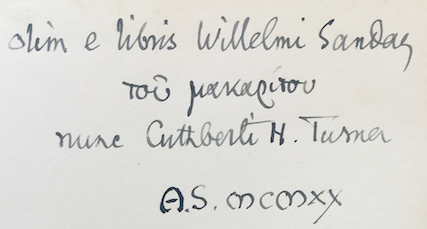I cannot stay away from old books. The feel, the look, the smell. These all capture for me the power of the written word. What also invests even more weight in a book is the history of its ownership. I always check for any inscription. Upon whose library shelf did this book reside? What person or persons turned the pages and mediated upon its word? Did they mark in the margins? This blog is about a set of books that recently came into my possession; its scholarly and historical provenance is weighty.
The books are two-volumes by the French biblical scholar Alfred Loisy (1857-1940) entitled Les Evangiles Synoptiques (1907-08). Loisy is an author not well known today, but in his day, he challenged the Roman Catholic Church with his critical analysis of the biblical text. Perhaps his most famous quote is “Jesus foretold the kingdom, and it was the Church that came; she came enlarging the form of the gospel, which it was impossible to preserve as it was, as soon as the Passion closed the ministry of Jesus.”[1]
In 1903 all five of Loisy’s books he had written up to that time were condemned by the Holy Inquisition and placed on the Index Librorum Prohibitorum. Because he was part of the modernist movement and used critical methods for the study of the Bible, he was excommunicated from the Roman Catholic Church in 1908 and died outside of it in 1940. His motto was “Catholic I have been, Catholic I remain; critic I have been, critic I remain.”
The inscription below is found inside the book.

olim e libris Willelmi Sanday
του μακαρτου
nune Cuthberti H. Turner
A.S. MCMXX
The Latin and Greek translate something like this:
Once the books [of] William Sanday
of blessed [memory]
now [the books of] Cuthbert H. Turner
A. D. 1920
William Sanday (1845-1920) was a British theologian and biblical scholar at Oxford University. He was the Dean Ireland’s Professor of the Exegesis of Holy Scripture. It was in the year he died (1920) that C. H. Turner (1860-1930) came into procession of these personal volumes. Perhaps Sanday bequeathed these volumes.
The Greek phrase του μακαρτου (“of the blessed one”) seems to indicate Professor Sanday had passed away. It also illustrates Turner’s respect for him. This respect is demonstrated in C. H. Turner’s inaugural lecture when he became Dean Ireland’s Professor of the Exegesis of Holy Scripture at Oxford in 1920. In his inaugural lecture, he focused upon the contribution of William Sanday. [2]
How did these volumes from the shelves of Oxford University and from esteemed Victorian biblical scholars make their path to Kansas City, MO? That journey remains a mystery.
[1] This quote is found in The Gospel and the Church, trans. Christopher Home (New York: Scribner’s Sons, 1909), p. 166. It was originally published in November 1902 as L’Evangile et L’Eglise. [The English translation of the book is in public domain and can be found on Google Books: The Gospel and the Church.]
[2] It was published as The Study of the New Testament 1883 and 1920 (Oxford: Clarendon Press, 1920). [This book is also in public domain and can be found on archive.org: https://archive.org/details/studyofnewtestam00turn.]
Leave a comment